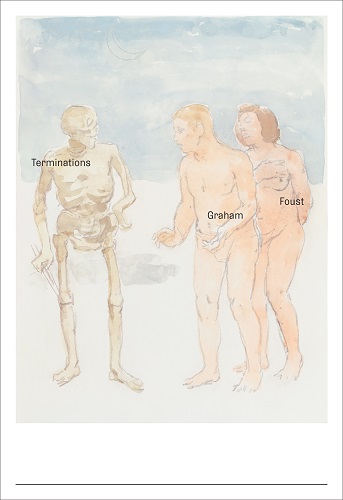Stuff is time, time stuff, the feelgood ruthless:Thirty shells that want nothing to do with one another,the person I wanted to love moving into the dark.Stuff is time, time stuff, the feelgood ruthless:“Put back, you’re where you would’ve been besthad you not had to be,” but the chorus forgets(or rather, as it’s dead now, it forgot) the sweet spotnot long after nascence, but well before any obligation.Stuff is time, time stuff, the feelgood ruthless:None of me are ever alone, I’ll give us that(not to mention that the bulk of us are ugly)but I’m the only one whoever’s up here is—blunt quiet; left, right; not not peculiar—and I no more wake to forget than live to heal.
Off the Beach
Graham Foust
Feature Date
- October 19, 2023
Series
Selected By
Share This Poem
Print This Poem
“Off the Beach” from TERMINATIONS by Graham Foust.
Published by Flood Editions on October 15, 2023
Copyright © 2023 by Graham Foust.
All rights reserved.
Reproduced by Poetry Daily with permission.
“Reading Terminations is like watching a make-up tutorial in reverse—which is to say, the deconstruction of an art that, on its face, is applied to conceal and therefore beautify what is inherently colored by the decay it daily wears. So it shocks us to see something so seemingly done-up come undone and more shocking (and uncanny and satisfying) still to realize ah, that’s what it looks like under all that bake and contour. How odd. You realize, after you’ve been terminated two or three times by Graham, that there’s no hiding from this, the naked face of language, the dull and perfect void we all inhabit and never, fortunately or unfortunately, will find ourselves grayed-out by. The point is, nevertheless, not ‘to be a goddamned monster,’ about what you see (and deftly don’t) when the makeup comes off and the words bend in heat and light, if you can help it. So help you God.”
—Andrew E. Colarusso
“Like Stevens, Foust writes intricate poems that explore a world from which meaning has departed; the poet seeks to restore it, however tentatively, through the powers of artifice.”
—Ben Lerner, Harper’s Magazine
Poetry Daily Depends on You
With your support, we make reading the best contemporary poetry a treasured daily experience. Consider a contribution today.





